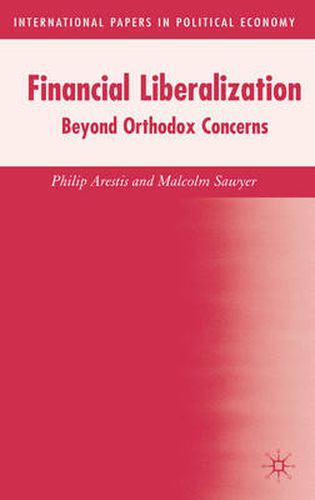Readings Newsletter
Become a Readings Member to make your shopping experience even easier.
Sign in or sign up for free!
You’re not far away from qualifying for FREE standard shipping within Australia
You’ve qualified for FREE standard shipping within Australia
The cart is loading…






This title is printed to order. This book may have been self-published. If so, we cannot guarantee the quality of the content. In the main most books will have gone through the editing process however some may not. We therefore suggest that you be aware of this before ordering this book. If in doubt check either the author or publisher’s details as we are unable to accept any returns unless they are faulty. Please contact us if you have any questions.
The financial liberalization thesis emerged in the 1970s and has been of considerable importance ever since, not merely in terms of its theoretical influence but, perhaps more importantly, in terms of its impact on policy makers and policy debates. Although it has encountered increasing scepticism over the years, it nevertheless had a relatively early impact on development policy, which still continues unabated, through the work of the IMF and the World Bank. The latter two institutions, perhaps in their traditional role as promoters of what were claimed to be free market conditions, were keen to encourage financial liberalization policies as part of more general reforms or stabilization programmes. This book explores what we have learned from the vast experience of the theoretical and policy aspects of the financial liberalization.
$9.00 standard shipping within Australia
FREE standard shipping within Australia for orders over $100.00
Express & International shipping calculated at checkout
This title is printed to order. This book may have been self-published. If so, we cannot guarantee the quality of the content. In the main most books will have gone through the editing process however some may not. We therefore suggest that you be aware of this before ordering this book. If in doubt check either the author or publisher’s details as we are unable to accept any returns unless they are faulty. Please contact us if you have any questions.
The financial liberalization thesis emerged in the 1970s and has been of considerable importance ever since, not merely in terms of its theoretical influence but, perhaps more importantly, in terms of its impact on policy makers and policy debates. Although it has encountered increasing scepticism over the years, it nevertheless had a relatively early impact on development policy, which still continues unabated, through the work of the IMF and the World Bank. The latter two institutions, perhaps in their traditional role as promoters of what were claimed to be free market conditions, were keen to encourage financial liberalization policies as part of more general reforms or stabilization programmes. This book explores what we have learned from the vast experience of the theoretical and policy aspects of the financial liberalization.